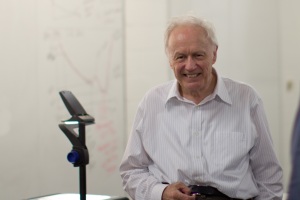 Formally, he is known as Sir Anthony Leggett — winner of the 2003 Nobel Prize in Physics for his important contributions to low-temperature physics and superfluidity.
Formally, he is known as Sir Anthony Leggett — winner of the 2003 Nobel Prize in Physics for his important contributions to low-temperature physics and superfluidity.
But for the past five years, most folks here at the Institute for Quantum Computing have gotten to know him simply as Tony.
Tony carries himself with a quiet, understated demeanour that belies his status as a winner of the world’s most prestigious scientific honour.
Tony has spent the past five summers at IQC as the Mike & Ophelia Lazaridis Distinguished Research Chair — delivering lectures, mentoring students and pursuing his research — and we’re delighted that he recently signed on for another five summers at IQC.
Tony’s summer lectures always cover a broad variety of topics, from the fundamental riddles of quantum science to specialized applications of quantum technologies. We recorded his lecture series this summer, and the videos are now posted for all to watch. A word of warning: these are not for quantum-rookies — they pretty much require at least an undergraduate grounding in quantum mechanics.
If you’re just getting acquainted with quantum science, you might want to start with the short clip below, in which Tony provides a unique take on the vexing “Many Worlds” hypothesis of quantum mechanics (during which, incidentally, he seems to assert that Schrödinger’s cat is female).
To delve deeper into the subject matter, check out the full playlist of Tony’s lecture videos.
